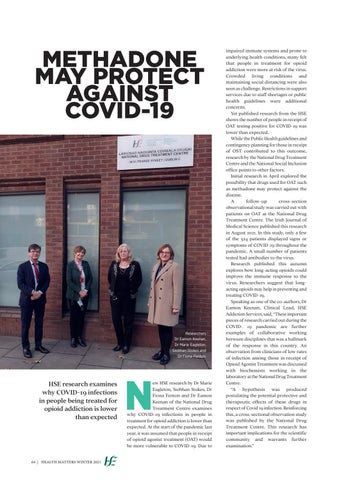METHADONE MAY PROTECT AGAINST COVID-19
Researchers Dr Eamon Keenan, Dr Marie Eagleton, Siobhan Stokes and Dr Fiona Fenton.
HSE research examines why COVID-19 infections in people being treated for opioid addiction is lower than expected
64 | HEALTH MATTERS WINTER 2021
N
ew HSE research by Dr Marie Eagleton, Siobhan Stokes, Dr Fiona Fenton and Dr Eamon Keenan of the National Drug Treatment Centre examines why COVID-19 infections in people in treatment for opioid addiction is lower than expected. At the start of the pandemic last year, it was assumed that people in receipt of opioid agonist treatment (OAT) would be more vulnerable to COVID-19. Due to
impaired immune systems and prone to underlying health conditions, many felt that people in treatment for opioid addiction were more at risk of the virus. Crowded living conditions and maintaining social distancing were also seen as challenge. Restrictions in support services due to staff shortages or public health guidelines were additional concerns. Yet published research from the HSE shows the number of people in receipt of OAT testing positive for COVID-19 was lower than expected. While the Public Health guidelines and contingency planning for those in receipt of OST contributed to this outcome, research by the National Drug Treatment Centre and the National Social Inclusion office points to other factors. Initial research in April explored the possibility that drugs used for OAT such as methadone may protect against the disease. A follow-up cross-section observational study was carried out with patients on OAT at the National Drug Treatment Centre. The Irish Journal of Medical Science published this research in August 2021. In this study, only a few of the 524 patients displayed signs or symptoms of COVID-19 throughout the pandemic. A small number of patients tested had antibodies to the virus. Research published this autumn explores how long-acting opioids could improve the immune response to the virus. Researchers suggest that longacting opioids may help in preventing and treating COVID-19. Speaking as one of the co-authors, Dr Eamon Keenan, Clinical Lead, HSE Addiction Services, said, “These important pieces of research carried out during the COVID- 19 pandemic are further examples of collaborative working between disciplines that was a hallmark of the response in this country. An observation from clinicians of low rates of infection among those in receipt of Opioid Agonist Treatment was discussed with biochemists working in the laboratory at the National Drug Treatment Centre. “A hypothesis was produced postulating the potential protective and therapeutic effects of these drugs in respect of Covid 19 infection. Reinforcing this, a cross-sectional observation study was published by the National Drug Treatment Centre. This research has important implications for the scientific community and warrants further examination.”
















































